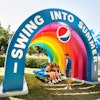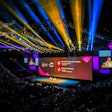
For the second year in a row, AAE Speakers Bureau has released its Speaking Industry Benchmark Report, based on a survey of hundreds of event professionals, keynote speakers, entertainers, emcees, and talent managers. The results offer an interesting and useful glimpse at what's trending in event programming now, along with insights into budgets, timelines, pain points, the benefits of virtual vs. in-person, and much more.
After the successful reception of the company’s 2022 report, AAE Speakers Bureau founder and CEO Greg Friedlander believes that “event profs and speakers both want a deeper understanding of the industry—and especially the speaker booking process,” he says. “They strive to make more informed, data-driven decisions."
Friedlander acknowledges the challenges the event industry continues to face this year, noting that event organizers are still deeply focused on watching and responding to economic fluctuations—and are therefore being even more thoughtful with their programming and budgets. Other trends that stood out to him this year? “Experienced event speakers focused on topics around mental health and corporate culture will continue to be in demand," he says. "[And] virtual events, while not the majority of events planned, will continue to be part of the strategic event mix for many organizations this year.”
Click here to request a full copy of this year's report—and read on for some more insights into what’s trending now...
1. Economic uncertainty is having a major impact.
According to the report, more than 80% of event organizers are concerned about the impact of economic uncertainty on their 2023 event plans, and the majority say budgets are down, which is impacting their decisions around event format—and lowering budgets for speaker fees.
Jennifer Best, the vice president of marketing for AAE Speakers Bureau, notes that this increased focus on budget is a change from last year’s report. “When asked about the top factors that determine how they choose their bookings in 2022, the top answer was that the event topic is relevant to their expertise. In 2023, this is still a major priority—coming in at number two—but it seems that money is more important this year,” she said.
2. But speakers are increasingly prioritizing their fees.
On the flip side, more than 53% of speakers say their fees are increasing in 2023. Speakers also cited fees as the No. 1 thing that makes them likely to accept an offer. The key to addressing this discrepancy? Thinking strategically.
Margo Dunnigan, the COO of AAE Speakers Bureau, is seeing more organizations be even more thoughtful about their speaker strategy this year. "More than budget implications, we’re seeing organizations be more thoughtful about their programming in general,” she says, adding: “Our clients continue to prioritize finding the right speaker for their event within their budget range.”
(Fun fact: The report notes that the average event budget for 2023 is $26,582.88, and the average speaker fee is $15,551.72 for in-person events.)
3. There should be a plan for tackling controversial topics.
In today’s increasingly polarized world, AAE decided to add a question on controversial topics to this year’s benchmark report. More than 72% of respondents said they’d be willing to ask a speaker to tweak their presentation if the ideas were polarizing, and almost all (95.85% of speakers) said they’d tweak their presentations if asked.
Best says the team added this question based on anecdotal evidence they’ve observed over the years, where event organizers and speakers have to adapt and cooperate on the fly when these issues come up. “This year’s report confirmed that speakers care whether an organization aligns with their values when it comes time to make decisions on speaking engagements. To us, that just makes understanding how speakers and event pros approach potentially controversial subjects much more interesting,” Dunnigan says.
4. Event attendance is top of mind this year.
While finding speakers who engage the audience is still important, this year’s report showed an even more important factor: attendance. “In our 2022 report, we asked event organizers what they hope the speaker will impact most when it comes to their events. The number-one answer was audience engagement,” recalls Best. “This year, 87.23% listed attendance as the most important metric for event success, and engagement came in at No. 3, with just 35.6% of event organizer respondents selecting it.”
Best thinks this increased focus on attendance is driven by the steady increase in live events. “The return to in-person events, especially when combined with concerns about the economy, is likely causing event attendees to be more selective in which events they attend—making this metric even more valuable to event organizers,” she notes.
5. Corporate culture is an increasingly popular speaking topic.
Like last year, the speaker topics event strategists are heavily prioritizing this year are diversity, equity, and inclusion; leadership and motivation; mental health and mindset; and the future of work. In 2023, though, the report showed increased prioritization of corporate culture as a speaking topic. “This year nearly 28% of respondents answered this way—which also meant that corporate culture jumped technology to make its way into the top five [topics],” Best points out.
6. More events are being held this year.
Events are back with a vengeance! The report showed a 26% average increase in events planned in 2023, in comparison to the previous year. Unsurprisingly, the most popular format reported is in-person, making up almost 55% of events planned this year. But virtual is actually holding steady, accounting for 29% of events, with hybrid rounding out around 16% of planned events. The trends are mostly in line with speaker preferences, a resounding 70% of whom prefer presenting in person.
And holding steady with last year’s report, the majority of respondents think that 45 minutes to an hour is appropriate for in-person presentations, whereas virtual presentations should be shorter, clocking in around 30-45 minutes.
7. Many speakers are comfortable with shorter booking timelines.
In some good news for busy event professionals, 45% of speakers reported they only need two to four months’ notice for an event—and that timeline is even shorter for virtual events.
8. Clear communication is essential.
When asked about the biggest pain points of working with event organizers, speakers cited issues such as not understanding who is in the audience, and not getting clear communication in a timely manner. On the flip side, organizers also cited the importance of communication, with 12% citing unclear communication as their biggest challenge when working with speakers.
Overall, this year’s report has left Friedlander increasingly optimistic about the future. “From the beginning, I’ve always believed in the speaking industry. It’s what drove me to found AAE Speakers Bureau over 20 years ago and create a partner for event organizers to walk them through the booking process,” he explains.
“In recent years, our industry has faced a shifting landscape for events," he adds. "We’ve seen our clients and industry friends consistently find ways to come through these challenges stronger and more equipped to create amazing event experiences for their audiences. This phenomenon, coupled with their willingness to share ideas and support one another, leaves me hopeful about our future.”
Click here to request a full copy of the 2023 report.



















